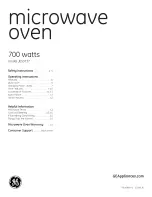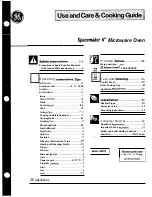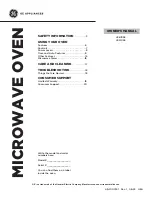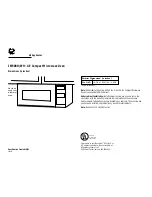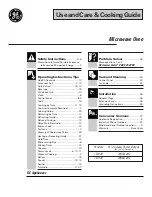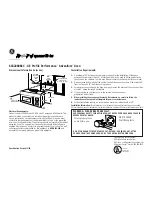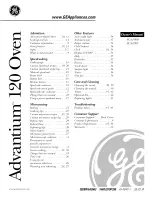
Cleaning and Care
Specifications
These steps should be taken after every use.
Model No.
MMB09
Mains Voltage
230V-240V AC, 50 Hz
$
Disconnect the power supply and wait for the
Mains Power
1200 W
appliance to completely cool down.
Oven Capacity
17 Litres
$
Remove the turntable support ring and the turntable
and wash then in warm soapy water.
Microwave Output
700 Watts
$
Clean the oven cavity, the outer edge of the cavity,
Microwave Frequency 2,450 MHz
and the oven door with water and a mild detergent.
Net Weight
11.3 kg approx.
A special microwave oven cleaner is not necessary.
Do not use scouring pads, or other abrasives.
UK: Waste electrical products should not be
$
Wipe the outer surfaces and control panel with a
disposed of with household waste.
damp soft cloth.
$
If liquids have been splashed on the wall of the oven
cavity, they must be fully removed otherwise smoke
e for details.
may occur when the appliance is next used.
ROI: Produced after 13th August 2005. Waste
$
If the cavity emits odours, boil a cup of water with a
electrical products should not be disposed of
squeeze of lemon juice for 5-7 min. to remove them.
with household waste. Please recycle where
$
Dry all parts thoroughly and replace them.
facilities exist. Check with your Local Authority
or retailer for recycling advice
Warranty
THIS APPLIANCE MUST BE EARTHED
Your Tesco appliance is covered by a warranty for 12
months from the date of purchase. If a fault develops
during this period, please contact the TESCO electrical
help line on 0845 456 6767. Please have your original
purchase receipt with you when you call. This warranty in
no way affects your consumer rights.
Separate
disposal facilities exist, for your nearest
facilities. See www.recycle-more.co.uk or in-
stor
Tesco Stores Ltd,
Delamare Road, Cheshunt, Herts, EN8 9SL
APPROXIMATE COOKING TIMES FOR FRESH VEGETABLES (ON FULL POWER)
Item
Weight
Added water
Cooking Time
Aubergines (peeled and diced)
450g
30-40 ml
5-6 minutes
Broccoli (trimmed and sliced into spears)
225g
50 ml
4-5 minutes
Brussels Sprouts(peeled)
225g
50 ml
6-8 minutes
Carrots (diced)
225g
30 ml
6-8 minutes
Cauliflower (in florets)
450g
50-60 ml
8-10 minutes
Courgettes (diced or sliced)
450g
10 ml
6-8 minutes
Peas (removed from pods)
225g
40-50 ml
5-6 minutes
Potatoes, jacket ( 2, scrubbed and pierced all round)
225g
None
8-9 minutes
Potatoes, (in 40mm pieces)
450 g
40-50 ml
7-8 minutes
Spinach (shredded)
225g
None
4-5 minutes
The times given above are approximate and should be adjusted to suit quantities, portion sizes and individual taste. The
average cooking time for vegetables is around 6 minutes per 450 g (1 lb). When adding salt, mix it with the water or add it
after cooking.
To cook vegetables: Mix them with the water in a ceramic curved bottomed bowl and cover lightly. After cooking leave the
vegetables to stand for 2-3 minutes before straining (if necessary) and serving.
APPROXIMATE COOKING TIMES FOR FISH (ON FULL POWER)
Item
Weight
Cooking Time
StandingTime
Cod fillets
450g
3-4 minutes
4-10 minutes
Cod steaks
225g
3-4 minutes
4-10 minutes
Haddock fillets
225g
3-4 minutes
4-10 minutes
Kipper fillets
450g
3.4 minutes
4-6 minutes
Plaice fillets
225g
3-4 minutes
6-8 minutes
Trout (2 fish, gutted but whole) turn fish over half way through
4-6 minutes
The times given above are approximate and should be adjusted to suit portion sizes and individual taste. The average
cooking time for fish is around 4 minutes per 450 g (1 lb). The fish should be lightly covered during the standing period.
Is it cooked?
$
Fish should be opaque and flake easily.
$
Temperature should reach 70º C for fish.
Page 6
MMB09
Microwave Oven
User
Guide
$
Handle pastry-wrapped foods like mince pies
Tips for good cooking
carefully as the filling gets hotter than the pastry.
Please read this section in conjunction with the Safety
Hints for reheating food
Guide on Page 2.
$
Heat leftovers and pre-cooked food to at least 70°C.
IMPORTANT NOTE: Raw meat should never be fully
Food should be hot and steaming before it is served.
cooked in a microwave oven. You may partially cook raw
$
When re-heating liquids such as meat stews see that
meat in a microwave provided you complete the cooking
the liquid boils for around 3-5 minutes to ensure the
process by conventional methods - i.e grilling, roasting etc.
pieces of meat are completely heated through.
$
Stir liquids and purees before during and after cooking
to distribute the heat evenly. Mashed potato will cook
more evenly and more thoroughly if lightly covered.
$
Only defrost food in the microwave if you plan to
$
Never tightly cover food. Always cover it loosely.
cook the food immediately after it has thawed. Some
areas of the food may begin to cook during defrosting,
$
Do not allow plastic film to touch food as it may
which can allow bacteria can flourish. Any raw meat
chemically break down or melt or even catch fire and
must be fully defrosted and then cooked by normal
contaminate the food.
cooking processes, i.e grilled, roasted, etc.
Do not
$
Arrange food in the dish so that the thicker part is on
cook defrosted raw meat in a microwave oven.
the outside and the thinner part inside for more even
$
When defrosting, remove the food from the
cooking. Fold under the thin edges of fish fillets and
wrapping, place it on a microwave safe dish. Rotate
tapered foods. Control the shape to get more uniform
and re-arrange food during defrosting. Where
results.
appropriate, stir the food and if possible, separate the
$
6-7 minutes per 500 gr. will cook most fruit and
food items and remove those which have already
vegetables. Seafood takes less time.
defrosted.
$
Different foods require different temperatures to
Steam and Smoke
cook. Add more minutes as you drop the power.
$
Steam is a natural product of microwave cooking. It
$
Up to 20% of the cooking takes place after the oven
escapes from the vents in the top and rear of the
turns off so always remember that your food will
appliance. These vents should never be blocked.
continue cooking after you've removed it.
$
Steam may condense in and around the oven during
$
Food that takes an hour in to cook in a regular oven
cooking and should be dried off after use.
should take around 15 minutes in the microwave.
$
If during cooking, smoke starts to come from the oven
$
Foods with baking powder should stand a few minutes
do NOT open the oven door! Immediately switch off
before cooking to allow the leavening agents to work.
at the mains, unplug the oven and wait for the smoke
$
If a recipe calls for milk and water, reduce the water.
to completely subside and the oven to fully cool down
$
Rotate large items of food occasionally during
before removing the food.
cooking to encourage even heat distribution.
$
Before you use your microwave oven again, consult a
$
Food cooks best and reheats better in a round dish or
service technician and have the oven tested .
a dish with curved sides.
Testing Your Oven
$
Salt attracts microwaves. Don't just sprinkle it on food
Place a cup of water in the oven and heat it on full power
before cooking, stir it in or add it later.
for 2 minutes. If the water gets hot the oven is working.
$
Fats and sugars attract microwaves - thoroughly mix
sugar with other ingredients. Care should be taken
when cooking foods with high sugar or fat contents as
they can reach very high temperatures.
Hints for defrosting
Page 5
MMB09
Microwave Oven User Guide



